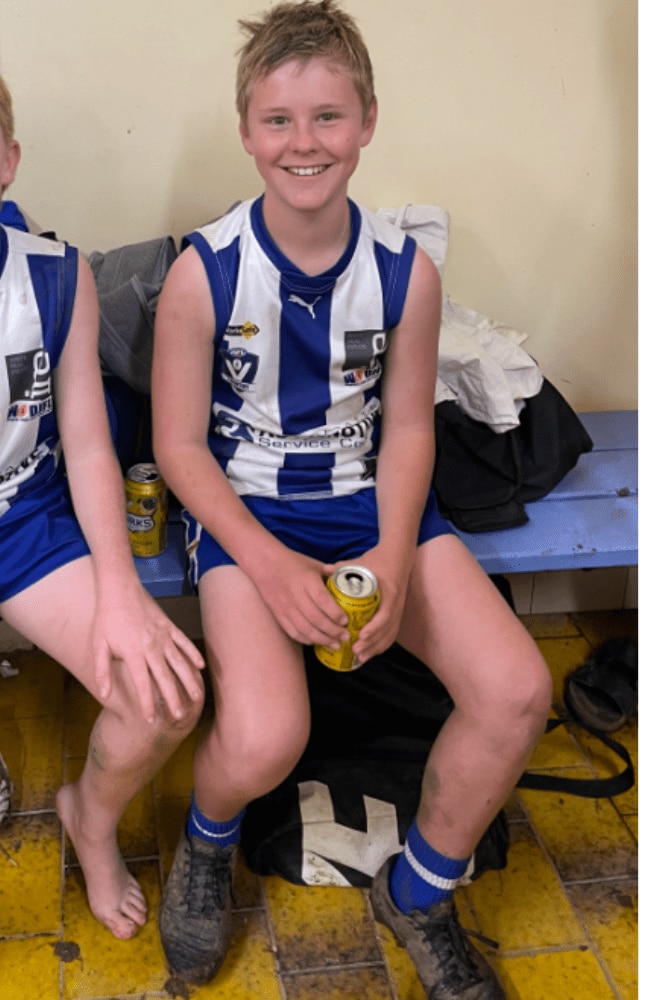‘My son was severely allergic to peanuts; now, he eats them every week’
“Hudson had to grow up a little bit more than what he should have… Now he eats peanuts all the time,” the Australian mum told Kidspot.

Family Life
Don't miss out on the headlines from Family Life. Followed categories will be added to My News.
Hudson was 11 months old when his parents noticed his unusual reaction to peanuts.
He’d had peanuts a few times before and hadn’t shown any reactions.
However, while munching down peanut butter on toast, he started to become “really raspy” and sounded “stressed”.
Want to join the family? Sign up to our Kidspot newsletter for more stories like this.

"Excuse me, are they nuts in that?"
By the time they got him to an emergency department, “he’d sort of settled”, mum Hayley told Kidspot.
Without answers, the family wouldn’t know what was wrong with their son until he was two years old.
RELATED: ‘How we managed to outsmart our son’s peanut allergy’
After meeting with a paediatrician, Hudson was tested at the Children’s Hospital, where they learned he was anaphylactic.
Almost three per cent of Australian children have a peanut allergy, occurring in about one in 50 children - and Hudson was one of them.
Suddenly, his world was flipped upside down.
“It was really tricky,” Hayley said. “Because he was so little, and he was in daycare.” As a toddler, Hudson was taught to ask everyone who offered him food if there were any nuts in it.
Introducing our new podcast: Mum Club! Listen and subscribe wherever you get your podcasts so you never miss an episode.
“If he went to a party or someone's house, he would have to say to whoever's house, ‘Excuse me, are they nuts in that?’” she recalled.
With the diagnosis, Hudson’s life was in constant danger; life now meant checking every label of food before purchasing it, making sure there were no traces of peanuts.
“It was tricky because you just didn’t know what could be in stuff,” Hayley said.
Hudson had to grow up quickly, too, learning how to administer an EpiPen himself.
“So he had to grow up a little bit more than what he should have, I guess, for a kid about age,” she continued.
RELATED: My daughter was kicked off a flight for having an allergy

“Now eats peanuts at the time”
Three years after his diagnosis, Hayley signed Hudson up to join the Prota Therapeutics trial at the Murdoch Children's Research Institute, where he would receive immunotherapy treatment for his allergy.
Developed by Professor Mimi Tang, it uses probiotics to desensitise the patient from their allergy.
It started with a “challenge” - getting Hudson to consume peanut protein to monitor for active symptoms. “He was getting a little bit emotional,” Hayley recalled. “We had to keep pushing until we saw welts; he had an itchy throat and sore tummy, and then the welts came up.”
After being accepted into the trial, Hudson was given his treatment every morning, with specialists increasing the dose over the span of 14 months. After 18 months, he was tested again.
“We didn't have any reactions,” Hayley said. “And he now eats peanuts at the time.”
His peanut allergy is still in remission, two years after taking his final dose of treatment.
Hudson is now 13 years old, and his life has changed once again. Except this time, he no longer lives in fear. “It was life-changing,” Hayley told Kidspot. “It was amazing.”
To maintain his regular consumption of peanuts, the family developed a routine of giving Hudson crunchy peanut cereal every Monday before school.
His aunt even gave him a “care package” after the trial, gifting him a large box filled with peanut-packed treats like Reece’s Peanut Butter Cups, Peanut M&Ms and a “jar of peanut butter”.
Australia has the highest rate of childhood food allergies than any other country on the planet. While scientists aren’t certain why Australia has such high food allergy rates, researchers are making strides to help reduce the rates of developing allergies.
On July 31, the federal government announced it was rolling out a nationwide program to treat infants with a peanut allergy through exposure therapy; it’s a treatment that is most effective for infants and children aged between one and three years old.
While this type of therapy has been shown to be less effective for older children, treatments such as oral immunotherapy have shown promising results.
More Coverage
Originally published as ‘My son was severely allergic to peanuts; now, he eats them every week’





